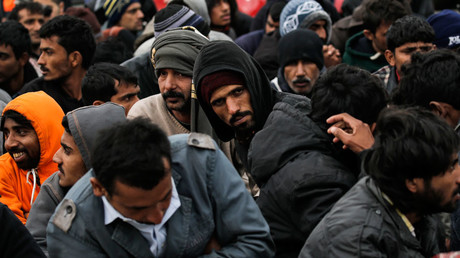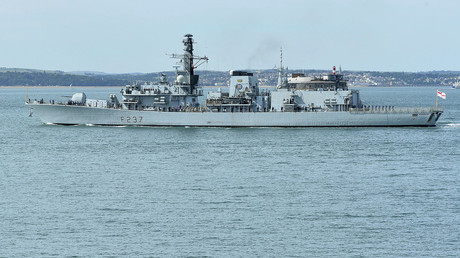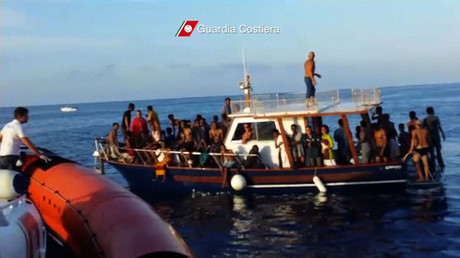The ministers also extended the operation’s mandate by one year to July 2017 in an attempt to curb the unending flow of migrants to the European countries.
“The Council [of member states] extended until 27 July 2017 the mandate for EU NAVFOR MED Operation Sophia, the EU naval operation to disrupt the business model of human smugglers and traffickers in the southern central Mediterranean,” a joint statement issued after the EU interior ministers’ meeting on Monday says, as quoted by AFP.
“The Council also reinforced the operation’s mandate by adding two supporting tasks — training of the Libyan Coastguard and Navy, and contributing to the implementation of the UN arms embargo on the high seas off the coast of Libya,” the statement adds.
The decision to boost the effectiveness of the Sophia mission was taken a week after the UN Security Council (UNSC) unanimously approved the inspection of vessels on the high seas off Libya for illegal arms on June 14, thus giving the EU mission a mandate to reinforce an arms embargo on Libya.
The arms embargo is expected to be a part of the crackdown on Islamic State (IS, formerly ISIS/ISIL) terrorists that gained foothold in Libya by using the power vacuum in the war-torn North African country.
It will also help the EU mission to deal with the people smugglers that contribute to the worst refugee crisis in Europe since the World War II, as gangs that profit from smuggling refugees and migrants to Europe also control illegal arms trade networks that stretch across Europe into North Africa via the Mediterranean, Reuters reports.
“We have to now act concretely, both against all those who exploit migrants … and in the fight against the arms smuggling, which benefits Daesh,” French Foreign Minister Jean-Marc Ayrault told journalists before talks with his EU counterparts in Luxembourg on Monday, using an Arabic pejorative term for IS.
Libya, which became a springboard for migrants trying to reach Europe, is laden with arms, according to the UN Libya support mission head Martin Kobler, who told the UNSC that there are about 20 million pieces of weaponry in the North African state of 6 million people, as reported by Reuters.
By controlling the arms flows to Libya, the EU also plans to provide weapons for the UN-backed Libyan unity government by granting exemptions in the embargo to help it to regain control over the country.
Launched in June 2015, Operation Sophia initially had mandate only for patrolling international waters off Libya, arresting people smugglers, saving migrants and destroying the smugglers’ vessels. However, in regard to the arms trafficking, its mission was limited only to surveillance and information sharing, meaning that the EU naval ships were not able to destroy weapons and catch traffickers.
At least one arms smugglers’ vessel has been recently allowed to pass an EU inspection in the Mediterranean Sea due to the lack of the UN authorization to act, Reuters reports, citing unidentified diplomatic sources.
The new mandate allows Operation Sophia that now comprises five naval vessels and three aircraft to inspect and seize suspicious vessels. Details on where weapon-carrying vessels would be brought, how the cargo would be handled and where smugglers would be charged are yet to be discussed, dpa reports.
In the meantime, the UK plans to send another ship to the mission, as well as helicopters and other assets from 24 EU governments. The EU also hopes that NATO ships sent to the Aegean Sea to stem migrant flows to Greece from Turkey, could also assist the mission by providing intelligence.
NATO officials plan to support the operation by providing maritime surveillance aircraft rather than ships, Wall Street Journal reports.
‘Improving security of Libyan territorial waters’
Another part of the newly-extended mandate of Operation Sophia focuses on the EU providing training for the Libyan Coastguard. The educational mission will start with up to 100 senior coastguard officials being trained for 14 weeks on board of a vessel in international waters and possibly then in Libyan waters, dpa reports, citing Sophia’s commander, Italian Rear Admiral Enrico Credendino.
The mission also envisages training onshore in some EU member states and third countries, including Libya if its authorities request it. The last phase will involve Libyan officials receiving on-the-job training on board their own vessels. Italy will also provide Libya with 10 patrol boats.
The EU training will help to “improve the security of the Libyan territorial waters, to improve the Libyan and the navy coastguard‘s ability to perform search and rescue activities … and to build closer relations with the Libyan authorities,” Credendino said, as quoted by dpa.
So far, Operation Sophia managed to arrest 71 suspected migrant smugglers, destroy 139 smuggler vessels and save 16,000 migrants, according to the EU data.
Source Article from https://www.rt.com/news/347535-eu-mediterranean-mission-libya/?utm_source=rss&utm_medium=rss&utm_campaign=RSS
Related posts:
Views: 0
 RSS Feed
RSS Feed















 June 20th, 2016
June 20th, 2016  Awake Goy
Awake Goy 


 Posted in
Posted in  Tags:
Tags: 
















